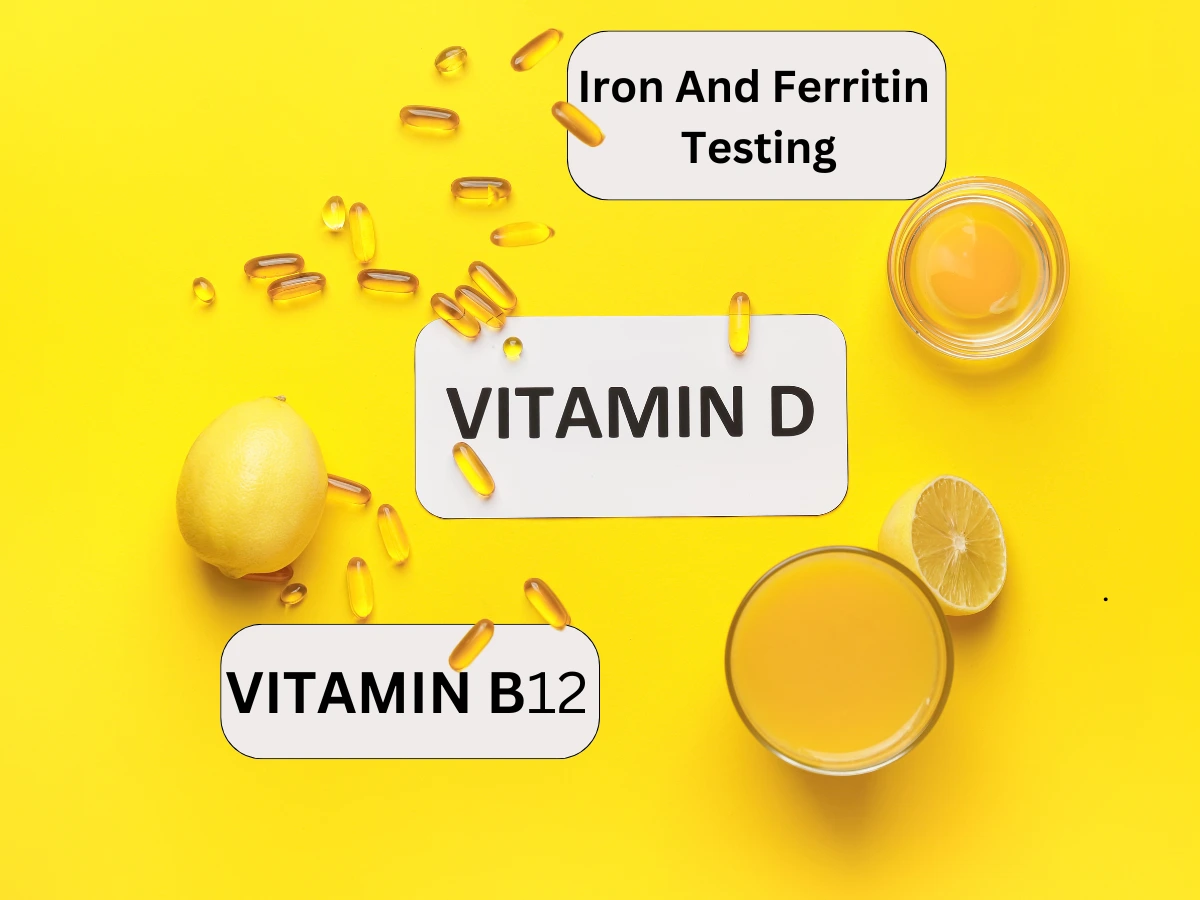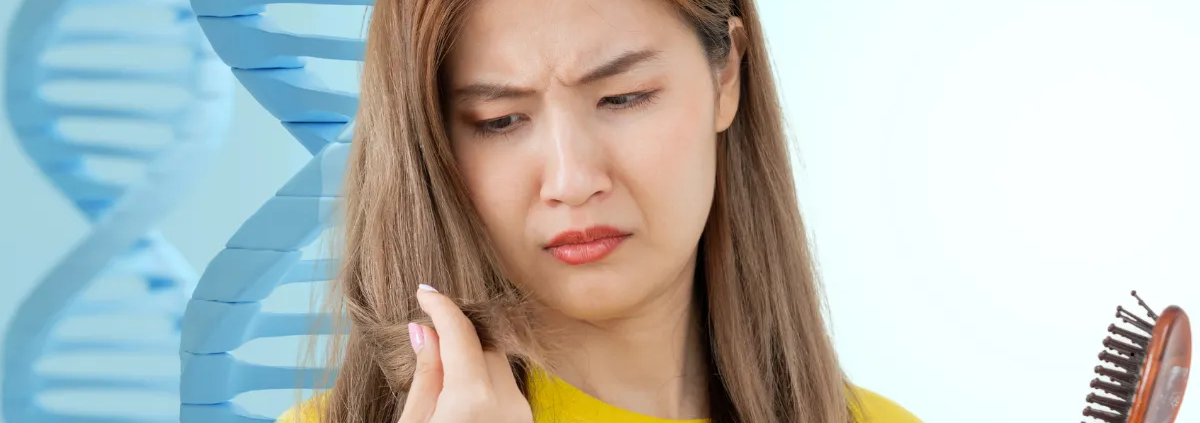What Vitamin Are You Missing if Hair Is Falling Out?
Have you noticed extra hair in your brush recently? Or is your once-thick ponytail looking a little thin? Do not panic! Hair loss may be frightening, but sometimes the answer is as easy as changing your diet. Let’s explore the world of vitamins and how they affect your beautiful hair.
The Vitamin Deficiency That Causes Hair Loss
When it comes to hair loss, not all vitamins are made equal. Some contribute significantly to the health and strength of your hair. Here are the major players:
- Vitamin D: The sunlight vitamin is good for more than simply bone strength!
- B-Complex vitamins: These include biotin, a well-known hair nutrient.
- Iron: Although not a vitamin, this mineral is essential for hair health.
Let’s look at how each of them affects your hair.
1. The Vitamin-D, The Sunshine Superhero
Vitamin D is like a superhero for your hair. It promotes the formation of new hair follicles, the tiny pores through which your hair grows. Without enough vitamin D, your hair may begin to thin down.
How can you obtain more vitamin D- Easily
– Soak up some sun (but remember your sunscreen!)
– Consume fatty seafood, such as salmon or tuna.
– Try vitamin D-fortified foods, such as orange juice or milk.
2. B-complex Vitamins: The Hair Growth Group
The B vitamins are like a group of pals who work together to maintain your hair healthy. Biotin (commonly known as vitamin B7) is the most well-known hair vitamin, although other nutrients such as B12 and folate are also crucial.
Here’s how these B vitamins benefit your hair:
– Biotin helps manufacture keratin, the protein that makes up your hair.
– B12 helps your body generate red blood cells, which transport oxygen to your hair follicles.
– Folate promotes cell growth and division, including in your hair follicles.
To get additional B-vitamins, consider eating:
- Eggs are high in biotin.
- Leafy greens, such as spinach and nuts/seeds.
3. Iron: The Oxygen Carrier
While iron is not a vitamin, it is vital for your hair. Iron helps red blood cells provide oxygen to your hair follicles. Without enough iron, your hair may begin to fall out.
Good sources of iron include:
- Red meat (assuming you are not a vegetarian).
- Bean and lentil
- Dark leafy vegetables, like kale
Which Vitamin Is Required to Stop Hair Fall?
Now, you may be asking, “Okay, but which vitamin do I really need to focus on?” The fact is that no one solution works for everyone. Your body is unique, so what works for your closest buddy may not work for you.
However, if we were to name a front-runner, it would likely be vitamin D. Many individuals are vitamin D deficient, particularly if they don’t receive enough sun exposure. Vitamin D deficiency may cause hair loss, among other health difficulties.
Remember, it’s not just about one vitamin. Your hair needs many nutrients to remain healthy. Think of it like a garden: beautiful flowers need water, sunshine, and proper soil to bloom.
Is it possible to reverse hair loss caused by vitamin deficiency?
Here’s some good news: Vitamin deficiency-induced hair loss may often be restored! Your hair is rather robust, and with proper care, it may bounce back.
The key is to:
– Determine which vitamins you are lacking.
– Incorporate vitamins into your diet and be patient as hair grows slowly. Results may take many months.
– Remember, hair does not grow overnight. But with continuous care and the appropriate nutrients, you may restore it to its former brilliance.
What Vitamins Are Effective for Female Hair Loss?
While the vitamins we’ve discussed are essential for everyone, several are especially necessary for women’s hair health.
- Iron deficiency is more common in women, particularly those who have heavy periods.
- Vitamin C improves your body’s ability to absorb iron.
- Vitamin E may help preserve your hair follicles from damage.
- To enhance these vitamins, consider including these items in your diet:
- Lean meats and plant-based iron sources, such as lentils
- Citrus fruits provide vitamin C.
- Nuts and seeds provide vitamin E.
Remember that a balanced diet is essential. Eating a variety of fruits, vegetables, and proteins can ensure that your hair receives all of the nutrients it needs.
What are Vitamin Deficiency Tests for Hair Loss?
Are you worried about vitamin deficiency? Don’t guess; get tested! Your doctor may do blood tests to check for different vitamin levels. Some frequent tests are:
- Vitamin D Test
- B12 test
- Iron and ferritin testing (ferritin is an iron-storing protein)

These tests help determine precisely what your body requires. It’s like a road map for your hair health journey!
Remember, always contact a healthcare professional before beginning any new supplement program or knowing vitamin deficiency that causes hair loss. They can assist you in determining the appropriate dose and ensuring that the supplements do not interact with any drugs you are already taking.
Treatment Options: Beyond Vitamins
While vitamins may help with hair health, there are instances when a more thorough approach is required in case of vitamin deficiency hair loss. This is where specialist testing, such as the HairLife Hair DNA Test, comes in.
HairLife DNA Test: Your Personal Hair Health Blueprint
The HairLife Hair DNA Test kit is similar to a crystal ball for your hair. It’s a tailored test that analyzes your DNA to determine your risk of premature hair loss, thinning, and even graying. Pretty awesome.
Here’s how the HairLife test may help you:
- Identify potential hair concerns and recommend preventive measures.
- Suggest hairstyles, dietary suggestions, vitamins, and hair-care products just for you.
- It’s like having a hair specialist in your pocket!
How Can It Help?
The HairLife test is particularly valuable if you have a family history of baldness. It can tell you whether you have gene variants associated with the following hair loss conditions:
- Androgenic alopecia (scientific term for male or female pattern baldness)
- Alopecia areata (which causes hair loss in tiny, circular spots)
- Telogen effluvium in females (the excessive shedding due to stress, hormonal changes, or medication.)
- Frontal fibrosing alopecia (FFA) in females (a condition that causes hair loss on the front and sides of your scalp)
With this information, you can make informed decisions regarding your hair care regimen and treatment alternatives. It’s like being one step ahead of hair loss!
Summary
Vitamin deficiency that causes hair loss may be difficult to manage but remember that you’re not alone, and there are options available. You have alternatives, whether it’s changing your diet, taking a vitamin supplement, or delving deeper into your DNA with a test like HairLife.
Remember, your hair reflects your entire health. Taking care of your body from the inside out benefits not only your hair but also your general health.
So, the next time you glance in the mirror and are concerned about hair loss, take a big breath. With the correct information and equipment, you can take charge of your hair’s health. Here’s to joyful, healthy hair days!





